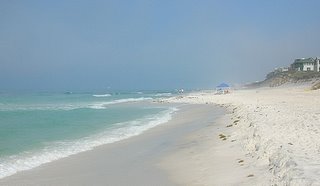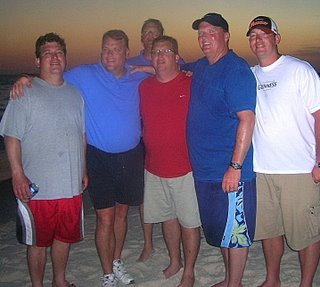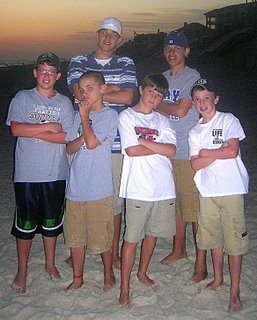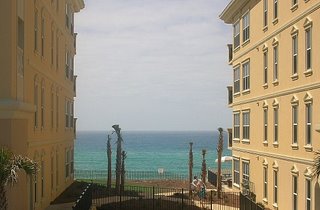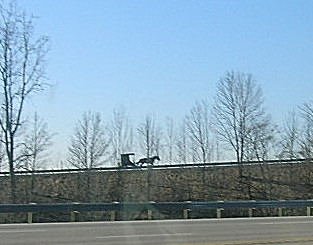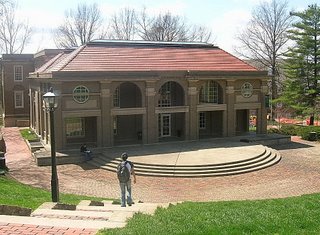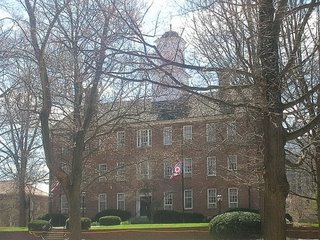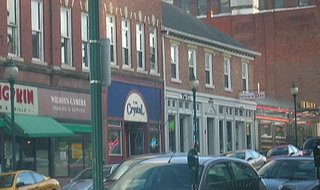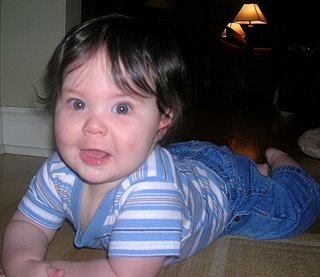Following is the full content of my e-mail interview with John Allen Jr. A portion of this interview appears in this month's Quill magazine.
TEN: Quill poses 10 questions to people with some of the coolest jobs in journalism
John Allen, Jr., Vatican correspondent, National Catholic ReporterOne year ago this month, Vatican correspondent John Allen Jr. was a staple on CNN, covering the death of Pope John Paul II and the election of Pope Benedict XVI. From his home in Rome he talked about how his career path led him to journalism.Q: What role did religion have in your childhood? Were you educated in
Catholic schools?"I was brought up as a Catholic and educated largely in schools run by the Capuchin Franciscans until I went to college. To be honest, however, I was not an especially pious child. Indeed, I spent much of my childhood rebelling against pretty much whatever was on offer, with religion usually taking pride of place. I remember once arguing with my freshman religion teacher that our catechism class should actually be called “indoctrination”! Looking back, I can say that my teachers showed heroic patience. Once, when I was expressing doubts about Christianity to a senior religion teacher, he handed me a thick book on theology, Hans Küng’s On Being A Christian, and suggested that I read it. When I think about it, he was paying me an enormous compliment, because he honestly believed that at the age of 17, I was capable of reading and digesting such complex material. (I wasn’t, but his confidence left an impression). I suppose the point is that these experiences sowed seeds that would later flower in a genuine interest in religion, even if there was precious little evidence of it at the time.
"One defect of that experience, however, is that my religious education, which spanned roughly the period from 1970 to 1983 (first grade through high school), was heavily influenced by the post-Vatican II euphoria in the Catholic Church, so that I received large doses of social concern and compassion, but relatively little in the way of solid content about the Catholic faith. Hence I spent much of my young adult years rebelling against something that I really didn’t understand. Most of the doctrinal, liturgical and canonical knowledge I have is essentially self-taught. I suppose this gives me a certain degree of understanding for debates in the Church today about catechesis, meaning passing on the faith."
Q: Tell us about your career path? Did you set out to cover religion or was
it accidental?"I never set out to be a journalist, let alone to cover religion. In 1992, I had just finished a master’s degree at the University of Kansas in religious studies, with a concentration in New Testament and early Christian literature. I went to the Claremont Graduate School in Los Angeles with the idea of earning a doctorate and going on to a career in teaching and scholarly publishing. My wife, who had just finished her undergraduate degree, was going to work while I studied, and then we would flip-flop. She, however, was unable to find a good job, so I decided to take a “part-time” position teaching religion at a Catholic high school. This school also needed someone to advise the student newspaper, and despite my lack of background, I got stuck with the assignment. Over time, I ended up being seduced by journalism, and started free-lancing for a variety of outlets, and not just on religion. (At one stage I was responsible for the “classic car” column in the Antelope Valley Press!)
Before long, the National Catholic Reporter offered me a job as opinion editor. I took it in 1997 because I liked the paper, not so much the job, since I wanted to write and report rather than edit. At roughly the same time, they were looking for someone in Rome to cover what they, along with every other media outlet in the world, believed would be the imminent death of John Paul II. Various candidates in Rome didn’t pan out, and eventually they asked if I would be interested. From my vantage point, covering the Catholic Church and being asked if you want to go to Rome is like playing baseball and being asked if you want to go to Yankee Stadium – in other words, a no-brainer. I arrived on a provisional basis to cover the European Synod in October 1999, and then on a permanent basis in July 2000.
"We set up shop at the same time that a number of American outlets were reducing their overseas presence, so when the sex abuse crisis, the war in Iraq, and finally John Paul’s death came along, we were well-positioned to be a leading point of reference in American discussion. I’d like to tell you it was all part of some cunning stratagem, but really it’s a simple matter of being in the right place at the right time."
Q: What’s it like living abroad and writing for an American news outlet? Are
there unique challenges in being remotely located?"In some ways, covering the Vatican for an American outlet is an advantage. The Vatican, like many overseas institutions, has something of a love/hate relationship with the United States, but at bottom is profoundly convinced of the importance of America’s role on the world stage. Hence Vatican officials will often make time for American reporters they wouldn’t necessarily give to Austrians, Dutch, or Japanese outlets. As one small sign of that, whenever the pope travels, the largest national contingent among the press corps on the papal plane is usually the Italians, but in second place are the Americans. Vatican officials are likely to attach importance to what you write that can at times be slightly exaggerated, but it means they’re paying attention.
"On the other hand, the mainstream American press generally doesn’t take religion, let alone the Vatican, terribly seriously as a news beat, so it can sometimes be difficult to get the attention of American editors and producers for stories you may think are important. The main challenge is that reporters have to be terribly self-disciplined, with a strong internal editor, because the kind of fact-checking and question-raising that normally goes on in newsrooms on other beats just doesn’t happen on this one. If you were covering the President of the United States and wanted to write a story saying he was about to drop dead, you’d have fight through a dozen editorial layers with their own contacts and perspectives before your story saw the light of day. Write the same thing about the pope and it can sail through to A1, because nobody back home knows any better.
"Finally, if you do a lot of American TV, Rome can be brutal, because the 10:00 pm East Coast time slot for prime time broadcasts is 4:00 am here. In heavy news cycles, that means a correspondent or analyst based here has to get accustomed to essentially going without sleep for several days in a row."
Q: Americans, including some Catholic Americans, often view the Vatican as
a great monolithic entity. How has your work shaped your view of the Vatican
and how do you cultivate sources there?"When you get to know the Vatican on an up-close-and-personal basis, what reveals itself is its complexity. This is not an organism with a unified intellect and will, but a complex bureaucracy that encompasses many different temperaments, visions, and policy positions. Hence sentences such as “the Vatican wants …” or “the Vatican is afraid that …” can make nice leads, but they’re almost always misleading over-generalizations.
"As far as cultivating sources, Woody Allen once said that 80 percent of success is showing up, and I’m a great believer in that. I go to a lot of conferences, book presentations, embassy receptions, symposia, and so on, all in order to make the personal connections that are the lifeblood of a beat like this. I also take a lot of people to lunch and dinner, which in Rome is where an awful lot of important business is done. My experience is that the Vatican really isn’t all that secretive. It’s more unique, in that it has a language and a psychology all its own. But if you have the time to “crack the code,” so to speak, you can usually find out most of what you want to know."
Q: You described the two weeks of John Paul’s funeral and the election of
Ratzinger as ‘the longest running infomercial for the Catholic Church in
primetime in the history of the planet.’ Nearly a year later, how do you
think the events of April 2005 have shaped the world’s view of the Catholic Church?"First, especially in places such as the United States, it gave the media a ‘Catholic’ story to do other than the sexual abuse crisis. Cardinals could go on television and talk about something other than lawsuits, protests and cover-ups. That was of tremendous importance, because it reminded the world that as important as the sexual abuse crisis undoubtedly is, it’s not the whole Catholic story.
"Second, it reminded a very secularized media that religion still has a powerful hold on a vast cross-section of humanity, and not just narrow-minded fundamentalists. It spoke to the enduring power of religious belief in a heavily secularized world. I remember sitting with Aaron Brown at 5:00 am Rome time, after a live broadcast to the States, on a Roman roof looking down at the vast rivers of humanity that had formed to catch a glimpse of the pope’s body lying in state, and Brown said simply: “There’s something here I don’t understand, but I know now I need to understand it.” I think that summed up the reaction of a lot of media people over those days.
"Third, it drove home what a vitally important institution the papacy still is, especially in the hands of someone who knows how to utilize its unique resources effectively. John Paul II may not have had any divisions to put in the field against the Soviets, but he still played an instrumental role in bringing down the Soviet system, and went on to be one of the titans of his time. When 57 presidents and prime ministers turned out for his funeral, the largest gathering of heads of state for the funeral of any human being in history, it was impossible not to grasp that the papacy still matters."
Q: What is your most vivid memory of John Paul II? "I covered John Paul for six years and traveled with him to 25 countries, so it’s essentially impossible for me to isolate one memory as most vivid. I could talk about the first time I met him, or the first time I was on the papal plane with him, or any number of other things. It’s easier to talk about the last memory I’ll have of him, because it’s still fresh. During the April 8 funeral Mass, I was part of CNN’s coverage team, seated next to Christiane Amanpour. I remember very clearly when the papal gentlemen lifted John Paul’s coffin at the end of the ceremony to take it inside St. Peter’s Basilica, and just before they passed through the main doors, turned it around for one last salute to the crowd. I described on television how appropriate this was, as this was a space John Paul had towered over in life, and now in death he had one final opportunity to enjoy that special magic he always enjoyed with crowds in the square. As I finished the sentence, I became emotional, because it flashed in my mind that this was the final sentence I would every write or speak about John Paul II in the present tense. Of course, I realize that John Paul was in some ways a controversial figure who governed in contentious times, and there’s a legitimate debate to be had about different aspects of his legacy. But he was nevertheless a unique, unrepeatable personality, and it struck me in that moment how much I would miss him."
Q: How did you become CNN’s Vatican correspondent? Does offering commentary
on television compromise your objectivity in print? Is it difficult to
maintain your objectivity given that you also are Catholic? "I was hired by CNN in 2001, and have been under contract as a Vatican analyst for them since. I don’t think it compromises my objectivity, because they don’t bring me on for opinion (there are plenty of people willing to offer that), but for insight into why the Vatican does certain things, what certain Vatican formulae mean, and so on. In other words, it’s my job to explain, not to editorialize.
"As for being a Catholic and covering the Church, I do think some reporters struggle with it. Some become defensive on behalf of the Church, and end up acting as an apologist. Others have a chip on the shoulder because of some resentment against the Church, and end up practicing advocacy journalism, crusading for some reform or another. It’s a fine line to walk between being close enough to understand, but far enough away to be objective. I try to negotiate that as best I can."
Q: Do you have a favorite CNN reporter? Who and why?"This is a dangerous question, because I have lots of friends at CNN and I hate to single out one person. I think people will forgive me, however, if I say it’s Delia Gallagher. Delia and I became good friends when she was in Rome for Inside the Vatican magazine, and we were CNN’s tag-team of analysts during John Paul’s 25th anniversary celebration in 2003 and during the death and conclave coverage in 2005. Delia is everything you want in a TV reporter; smart, unflappable under pressure, hard-working, and a transparently good person. I’m delighted, and very proud, about her success."
Q: Many people who have a brief papal audience talk about their inability to
speak in his presence. What was your reaction the first time you met the
Pope? Did the cat get your tongue or were you able to set emotion aside to
do the job? How often do you sit down with the pope?"The pope very rarely grants interviews, so journalists don’t often have one-on-one access to him. I suppose I met John Paul maybe a couple dozen times over the course of covering him for six years. I knew the current pope, Benedict XVI, relatively well in his previous position as head of the Congregation for the Doctrine of the Faith, and have met him now four times since his election.
"The first time I met John Paul one-on-one was on the papal plane during the trip to Kazakhstan in 2001. As I was preparing for the encounter, I ran through all sorts of things I could say, since by that stage I had written maybe a million words about his pontificate. When the time came, however, all I could croak out in Italian was, “Nice to meet you!” Since then, I’ve managed to be a bit more composed."
Q: What kind of readership do you have for The Word from Rome? Was it your
idea? How much editing goes into your piece before it’s sent?"It’s basically impossible to estimate readership on the Internet with any accuracy, though we conventionally use the number of 50,000. Before I came to Rome, I had suggested to my editors that I do a weekly “reporter’s notebook”-style feature on the Internet, since I would be gathering all sorts of material that for different reasons would not make it into the paper, and otherwise all that reporting would just be lost value. I had initially expected that maybe a few dozen Vatican junkies around the world would follow it, and I’ve been utterly astonished at the following the column has developed.
"Each week’s piece is read by Tom Roberts, the editor-in-chief at NCR, and by Dennis Coday, who does the technical work of posting it and sending out the e-mail alerts. Tom will often give me some editing suggestions, which I almost always follow, although he makes it clear that “The Word from Rome” is my space and ultimately it’s up to me. The selection of which stories to follow is always mine, since I’m the one on the ground.
"Probably the aspect of “The Word from Rome” of which I’m most proud is that its readership includes people from a wide variety of points of view, from quite conservative to quite liberal. I think that’s for two reasons. First, I try to offer solid reporting about the Vatican and the universal church that’s of interest to people regardless of their ideological perspective. Second, I make an effort to treat different perspectives with respect, and to try to understand people’s points of view sympathetically. My view is that there’s enough ideological “spin” out there, and people need places where they can find tools for doing their own thinking. I hope that, at its best, that’s what “The Word from Rome” provides."
Q: You file weekly reports from Rome, you write stories for the National
Catholic Reporter, you write in-depth books and you serve as a correspondent
for CNN. When do you sleep?"The reality is that there are some times when the news interest in the Vatican is quite intense, and in those periods I work pretty much around the clock. They’re followed, however, by long stretches in which the interest is much more relaxed, and that’s the time in which I can do the reporting and writing for the next book, have some conversations that aren’t related to today’s deadline, and catch up on sleep.
"In truth, I’m lucky to be following a beat in which I’m intensely interested, and I never have to force myself to keep going. I always look forward to the next assignment, the next interview, the next conference, or whatever it is, because I believe I’ve got the best beat in journalism. The Vatican may be a small window, but it opens up onto the entire world. If I’m interested in Iraq, or in bioethics, or in Islam, or in cultural debates over homosexuality, or whatever, there’s always a natural “Vatican angle” on the story. The work never gets boring!"
Q: Does Rome ever become tiresome? What do you miss most about the States?"The work isn’t tiresome, though Rome itself can sometimes be frustrating, especially for ex-patriates with American expectations about efficiency and customer service. I tell people that it’s the only city on earth where you can call a plumber in mid-November and he’ll tell you he’ll get back to you after the holidays, by which he means February! Yet going to one of the city’s magnificent restaurants, over fine wine and a four-course meal always eases the pain.
"As far as the States, in recent years I’ve been doing so much speaking across the country that I’m never more than a few weeks away from my next trip home, so I don’t really have time to miss it. I can say, however, that when I’m in Italy, the two things I crave from the States are real American breakfast and barbeque. When I’m in the States, however, after about 48 hours I get the shakes from withdrawal from
bucatini all’amatriciana, my favorite Roman dish, so I guess it’s always a mixed bag."
